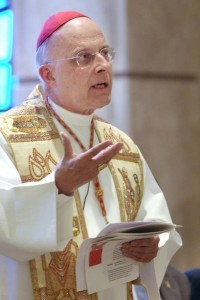Chicago’s Francis Cardinal George is probably the brainiest bishop ever appointed on these shores. He ranges easily over the whole Catholic tradition, from its earliest days to the very latest developments in modern Catholic thought. In addition, he has a Ph.D. from Tulane University, where he specialized in American philosophy – figures like James, Royce, and Peirce. The good cardinal also possesses a deep understanding of American culture and has made a special point of studying the difficult questions involved in enculturation of the faith.
In short, he is a man of considerable savoir faire, and also currently serves as president of the U.S. Conference of Catholic Bishops. He made a passing reference at a conference last week about the “extreme embarrassment” caused by the invitation of President Obama to Notre Dame. Lots of attention has been paid to that invitation, but very little to the often quite ugly reaction by Catholics themselves to Church leaders who have spoken out, as happened after the cardinal’s casual remark. That lack of attention is unfortunate because thereby hangs an important tale.
It’s no secret that about two-thirds of American Catholics are such mostly in name only. Quite apart from questions of belief, they are almost entirely non-practicing. Some who are marginally more active seem to have learned about faith and morals from what the late comic Flip Wilson used to call the Church of What’s Happening Now, rather than from the Church of Rome or even Jesus Himself.
If you think I’m exaggerating, take a brief look at Kerry Kennedy’s Being Catholic Now, a highly touted book which, in a series of interviews with American Catholics, generally gives the impression that Jesus was a postmodern American. And that the hierarchy has been trying to keep us from finding out. She, too, is being honored this spring at several Catholic universities.
This is Holy Week, a time when we commemorate our Lord’s passion and death, about which the Church has always invoked the passage from Isaiah, “many were astonished at him – his appearance was so marred, beyond human semblance, and his form beyond that of the sons of men.” Some Catholics, not content to leave poor Jesus or His bishops in peace two millennia later, are still at the old job of disfiguring his image.
In the past few days, Cardinal George had to endure theological instruction from William M. Daley – a businessman and political operative and, yes, a member of that famous Chicago Daley clan, who, like the Kennedys of Massachusetts, have sacrificed so much to spread a better public understanding of Catholicism in our land. Writing in The Chicago Tribune late last week under the headline “Cardinal George, you’re dividing your church,” this tireless worker in the vineyard issued a public reprimand: “I believe that Cardinal George’s stand is an embarrassment to Chicago Catholics, and furthers the divide between the church, its members and the rest of America.”
Since a Chicago Daley believes such a thing, how can the president of the Catholic bishops’ conference and those bishops, who have been trained in Catholic theology and issued a considered statement about honoring culture-of-death politicians, divide the body over matters of faith and morals?
Indeed, Daley points out, in case there was any doubt, that the cardinal and American bishops, in issuing such a restriction, show a “very narrow view of what constitutes morality.” Banning pro-abortion speakers at universities is an attempt to assure that “the students at Catholic universities would hear only from other Catholics – and, even then, only from those who agree with church doctrine on every subject.” Given the closed-minded orthodoxy that reigns at Notre Dame and other Catholic institutions in America, you can appreciate Daley’s point.
And then there’s the cardinal’s greatest sin: mixing religion with politics in commenting on a speaker at a Catholic university. Daley becomes so emotional at this point that he wanders off into a rhetorical thicket from which he emerges with the salutary reminder that America is not a theocracy.
As they say, you cannot make this stuff up.
It’s no great surprise when a political partisan himself divides the body in this way. Only a very simple soul could wander into such deep waters without realizing he’s way in over his head. What is truly astounding, however, is the number of people who wrote in to agree with Daley. Such people have been catechized by the culture to tell you, as if it has been always and everywhere held beyond any dispute, that God is love and therefore accepts everything that a postmodern American progressive accepts – though He is getting really tired of bishops and other Catholics who repeat His actual teachings.
One self-promoting commentator, who shall not get further publicity here, claimed that the reaction of Cardinal George and the other bishops has “more than amply shown how out of touch the bishops are with the culture in which they live.” If so, I say: may their tribe increase.
If Catholicism is to be measured – indeed, all but defined – by our current culture, then what is the point of it, for Catholics or anyone else? If you will not be part of the body, fine. But let’s not confuse the Church with those whose Sunday morning devotion is The New York Times.
Regrettable as such divisions may be for both the Church and the nation, we belong to a Church whose founder drew boundaries and once even said: “Do you think that I have come to establish peace on the earth? No, I tell you, but rather division.”
It’s not something, pace William M. Daley and many others, the Church hierarchy merely made up. No, you can actually look it up.















